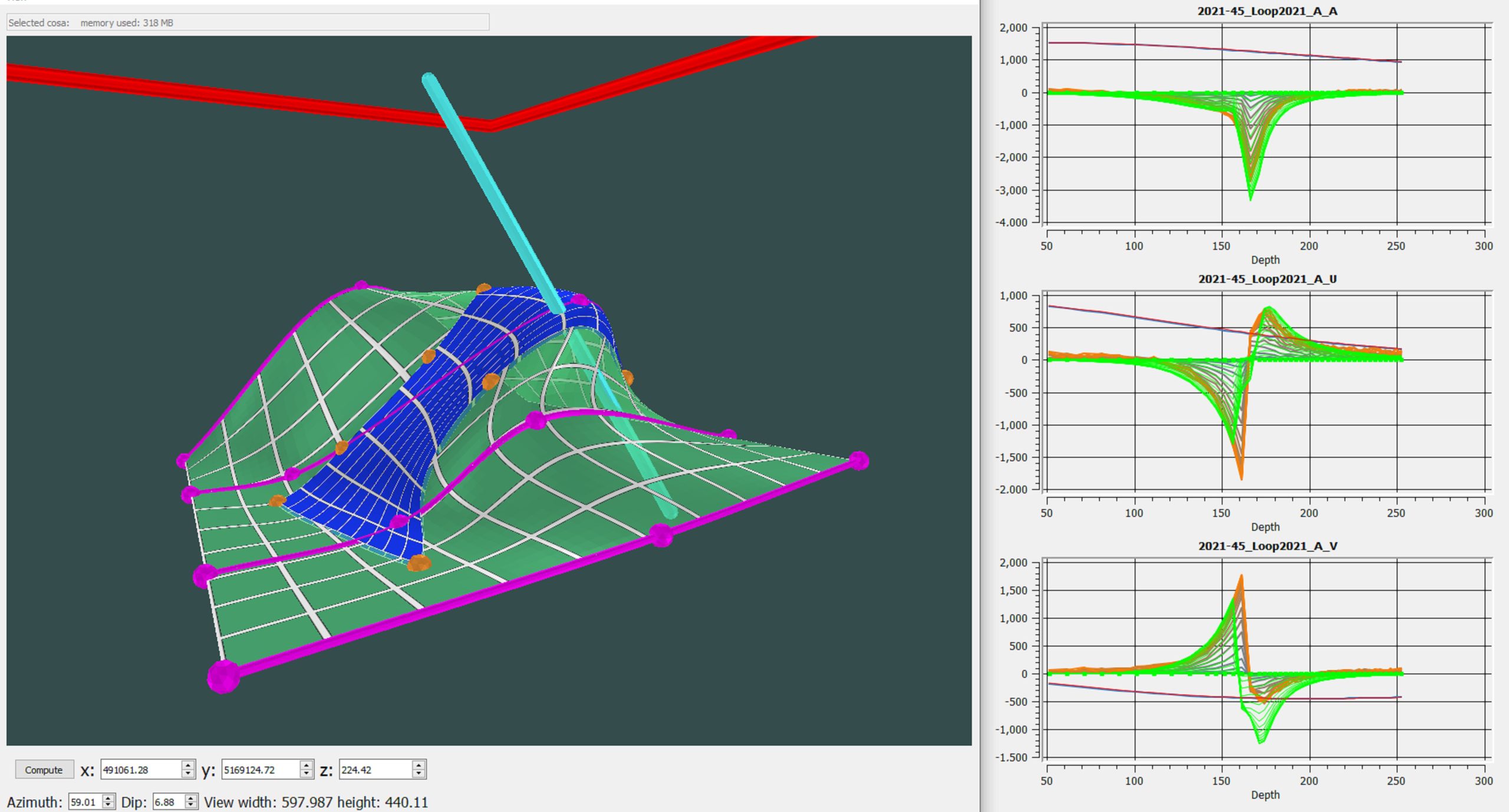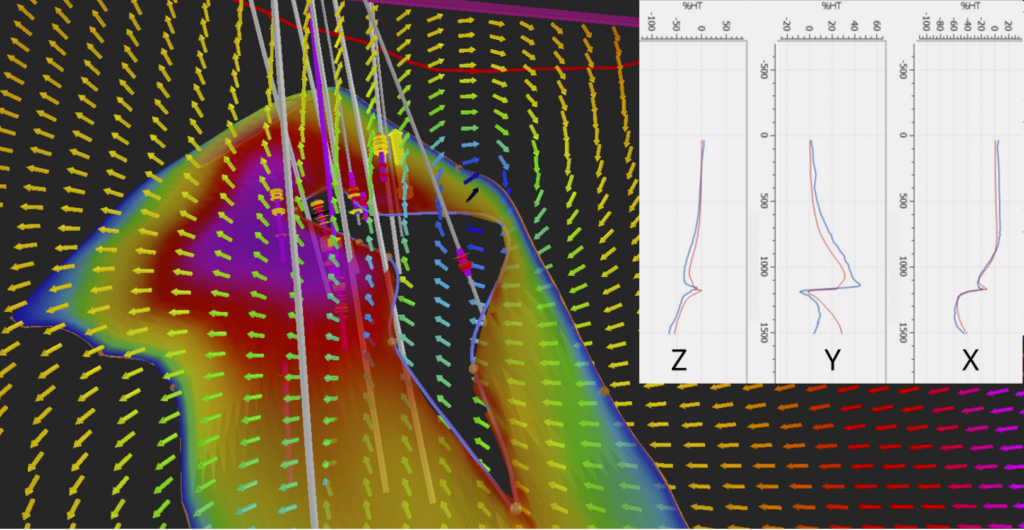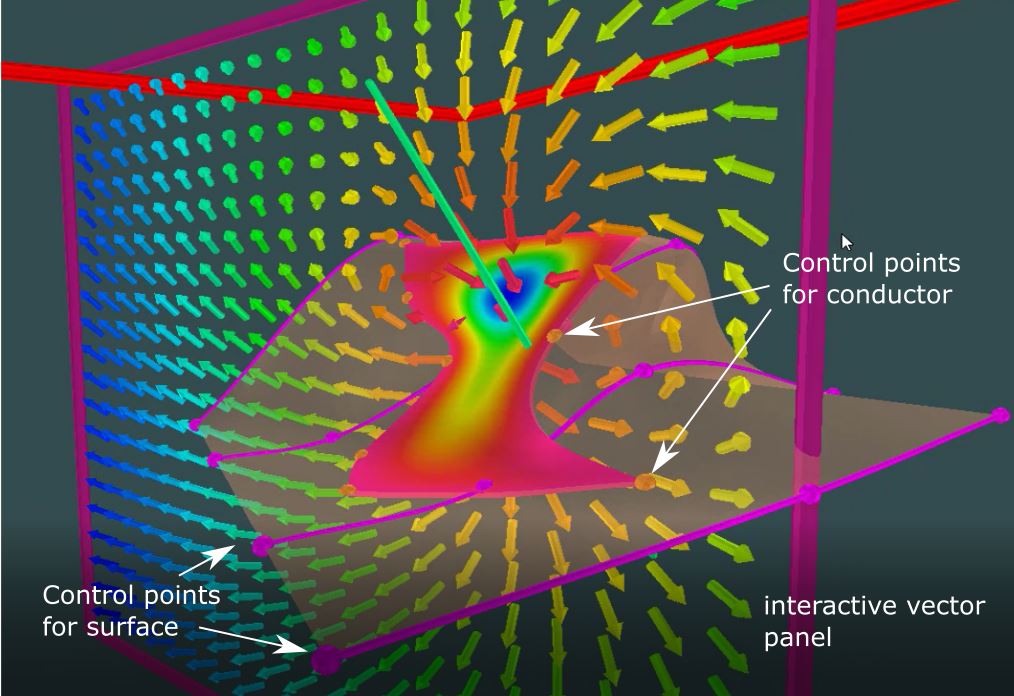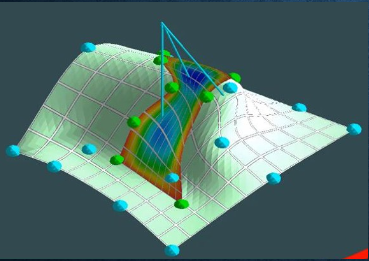Provus EM Modeling
Provus can easily simulate the EM response of mineral deposits using models that can have complex shapes better approximating deposit geometry. Provus uses Structured Deformable Sheets as the basis for computing the eddy currents induced on the conductor surface without the need to compute a regular triangulated mesh. Control points can be freely manipulated by the user allowing both the shape and the underlying mapping used by the EM calculation to change in “real time”. Compare simulated responses to field data with sophisticated plotting tools. Set up the optimizer to automate the iteration of the locations of selected control points against the misfit between observations and computed responses. Understanding of the simulated fields is aided by visualization of the induced eddy currents on the conductors themselves and as vector panels displaying their primary, secondary or total magnetic fields. Any number of complex conductors can be modelled, allowing for the physical mutual interactions between them.

Conductor Editing
Provus provides for easy creation and manipulation of conductors of complex shape. Each conductor is defined by one set of control points/lines defining the surface in which the conductor exists and by a second set of control points defining the conductor locus within that surface. The control points can be moved by dragging or keyboard commands. The result is a fluid easy interface for creating and modifying complex shapes.
Voids in Conductors
The shape of the Provus Ribbon Conductor can be further modified by the use of masking functions, allowing for the definition of more complex conductor boundaries as well as the introduction of voids (or holes) within the locus of the conductor.

Eddy Current diffusion#1
In this example Provus has been used to create a conductive plunging antiform truncated by the surface. A transmitter loop straddles the top edge creating two areas on the conductor surface that are reverse coupled to one another. The eddy currents are visualized by their potential painted on the conductor surface. The early time step response shows a figure eight current system reflecting the opposite coupling. As time progresses the diffusion of the currents favors the one with highest total early time moment so that at late time the eddy current become uni-polar.
Eddy Current diffusion#2
In this example a small part of the conductor sticks up near surface and is strongly energized by the transmitter loop. This area supports the dominant center of the eddy current vortex at early delay times (blue). At the later time the center of the current vortex migrates to the larger, deeper part of the conductor.
Model Response Fitting
EM Modelling requires the user to explore model conductor shapes, locations and attitudes to obtain a match between the field observations and the simulated responses. Provus combines easy modification of the conductor geometry, fast simulation computation and sophisticated plotting to help the interpreter define an optimal model. This process is made more efficient by aid of parametric inversion on the locations of the conductor model control points. Each computed model and model response are stored in a cache for later review and are ranked on the basis of RMS data misfit.
Plate Modelling
Provus supports rectangular plate modelling. Initiate a plate model or load it from a Maxwell “.pte” file. Manipulate the plate interactively and co-simulate with other plates and/or Provus conductors. Promote a plate to a Provus conductor and begin to deform it into more complex shapes.
Provus Fundamentals
Provus computes the eddy currents on one or more (coupled) conductors of complex shape induced by a transmitter loop or dipole carrying a specified current waveform. The technique uses a spectral method which decomposes a set of trial functions for the surface current density into a set of eigencurrents; each with an exponential decay. The trial functions are continuous functions over the surface of the conductor and unlike “ribbon model solutions” the set of trial functions is general enough to handle large gradients in the primary field excitation. The eddy currents are thus free to evolve correctly even when the primary field reverses direction across its surface.
Provus Modes
Unlike “Ribbon Modellers” that force the induced current to flow in a concentric pattern, Provus uses a 2D harmonic series in a rectangular domain mapped to a 3D complex conductor object. Using this “complete” set of basis functions allows Provus to represent eddy current diffusion more accurately in situations where the conductor is near or under the loop or where the coupling changes over the surface of a curved surface.

UI Details
Provus provides for easy creation and manipulation of conductors of complex shape. Each conductor is defined by one set of control points/lines defining the surface in which the conductor exists and by a second set of control points defining the conductor locus within that surface. The computed response can be viewed as profiles along surface, in the air or down boreholes, as eddy current potentials painted on the conductor surface or as vector fields presented on interactive panels. Take advantage of the seamless link to Geoscience Analyst (GA) to have the project conductors updated continuously in a GA session.
Vector Fields
Lorem ipsum dolor sit amet, consectetur adipiscing elit, sed do eiusmod tempor incididunt ut labore et dolore magna aliqua. Ut enim ad minim veniam, quis nostrud exercitation ullamco laboris nisi ut aliquip ex ea commodo consequat. Duis aute irure dolor in reprehenderit in voluptate velit esse
Lorem ipsum dolor sit amet, consectetur adipiscing elit, sed do eiusmod tempor incididunt ut labore et dolore magna aliqua. Ut enim ad minim veniam, quis nostrud exercitation ullamco laboris nisi ut
Lorem ipsum dolor sit amet, consectetur adipiscing elit, sed do eiusmod tempor incididunt ut labore et dolore magna aliqua. Ut enim ad minim veniam, quis nostrud exercitation ullamco laboris nisi ut aliquip ex ea commodo consequat. Duis aute irure dolor in reprehenderit in voluptate velit esse
Lorem ipsum dolor sit amet, consectetur adipiscing elit, sed do eiusmod tempor incididunt ut labore et dolore magna aliqua. Ut enim ad minim veniam, quis nostrud exercitation ullamco laboris nisi ut aliquip ex ea commodo co
Lorem ipsum dolor sit amet, consectetur adipiscing elit, sed do eiusmod tempor incididunt ut labore et dolore magna aliqua. Ut enim ad minim veniam, quis nostrud exercitation ullamco laboris nisi ut aliquip ex ea commodo consequat. Duis aute irure dolor in reprehenderit in voluptate velit esse
Lorem ipsum dolor sit amet, consectetur adipiscing elit, sed do eiusmod tempor incididunt ut labore et dolore magna aliqua. Ut enim ad minim veniam, quis nostrud exercitation ullamco laboris nisi ut aliquip ex ea commodo consequat. Duis aute irure dolor in reprehenderit in voluptate velit esse cillum dolore eu fugiat nulla pariatur. Excepteur sint occaecat cupidatat non proident, sunt in culpa qui officia deserunt mollit anim id est laborum.
Lorem ipsum dolor sit amet, consectetur adipiscing elit, sed do eiusmod tempor incididunt ut labore et dolore magna aliqua. Ut enim ad minim veniam, quis nostrud exercitation ullamco laboris nisi ut aliquip ex ea commodo consequat. Duis aute irure dolor in reprehenderit in voluptate velit esse cillum dolore eu fugiat nulla pariatur. Excepteur sint occaecat cupidatat non proident, sunt in culpa qui officia deserunt mollit anim id est laborum.
Lorem ipsum dolor sit amet, consectetur adipiscing elit, sed do eiusmod tempor incididunt ut labore et dolore magna aliqua. Ut enim ad minim veniam, quis nostrud exercitation ullamco laboris nisi ut aliquip ex ea commodo consequat. Duis aute irure dolor in reprehenderit in voluptate velit esse cillum dolore eu fugiat nulla pariatur. Excepteur sint occaecat cupidatat non proident, sunt in culpa qui officia deserunt mollit anim id est laborum.
Lorem ipsum dolor sit amet, consectetur adipiscing elit, sed do eiusmod tempor incididunt ut labore et dolore magna aliqua. Ut enim ad minim veniam, quis nostrud exercitation ullamco laboris nisi ut aliquip ex ea commodo consequat. Duis aute irure dolor in reprehenderit in voluptate velit esse cillum dolore eu fugiat nulla pariatur. Excepteur sint occaecat cupidatat non proident, sunt in culpa qui officia deserunt mollit anim id est laborum.
Lorem ipsum dolor sit amet, consectetur adipiscing elit, sed do eiusmod tempor incididunt ut labore et dolore magna aliqua. Ut enim ad minim veniam, quis nostrud exercitation ullamco laboris nisi ut aliquip ex ea commodo consequat. Duis aute irure dolor in reprehenderit in voluptate velit esse cillum dolore eu fugiat nulla pariatur. Excepteur sint occaecat cupidatat non proident, sunt in culpa qui officia deserunt mollit anim id est laborum.
Provus Foundation
3D Electromagnetic Modelling

Provus UI Details
3D Electromagnetic Modelling
Lorem ipsum dolor sit amet, consectetur adipiscing elit, sed do eiusmod tempor incididunt ut labore et dolore magna aliqua. Ut enim ad minim veniam, quis nostrud exercitation ullamco laboris nisi ut aliquip ex ea commodo consequat. Duis aute irure dolor in reprehenderit in voluptate velit esse cillum dolore eu fugiat
Provus GA interface
3D Electromagnetic Modelling

Provus Examples
Example 1
Lorem ipsum dolor sit amet, consectetur adipiscing elit, sed do eiusmod tempor incididunt ut labore et dolore magna aliqua. Ut enim ad minim veniam, quis nostrud exercitation ullamco laboris nisi ut aliquip ex ea commodo consequat. Duis aute irure dolor in reprehenderit in voluptate velit esse cillum dolore eu fugiat

